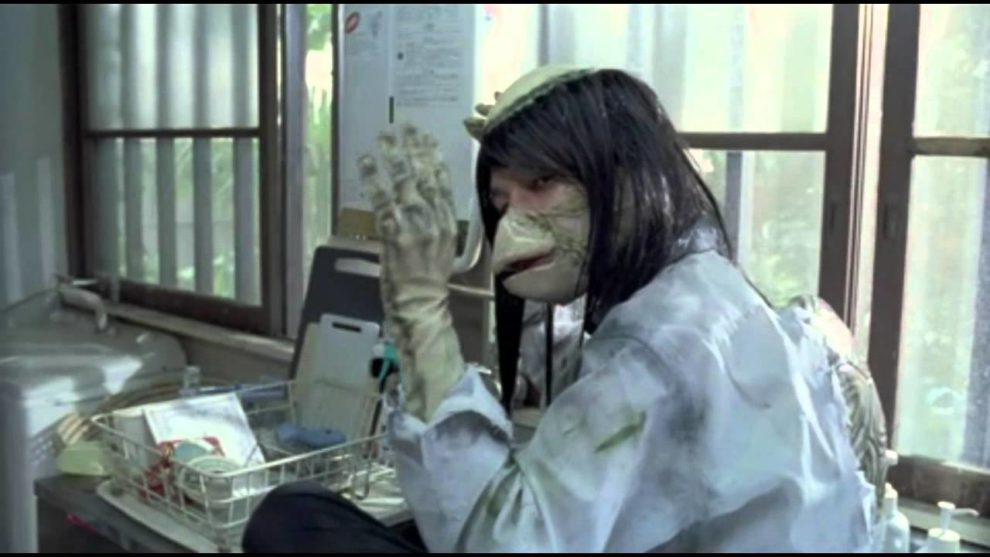While the pink film genre has certainly proven its versatility, both, formally and content-wise, the notion of blending pink film with the elements of a musical sounds quite outlandish at first glance. However, “Underwater Love”, directed by experienced filmmaker Shinji Imaoka, one of the “Seven Lucky Gods of Pink”, is a project which blends these two concepts into one, telling a story about love, death and how one is remembered in the minds of others. Supported by renowned cinematographer Christopher Doyle, this co-production between Kokuei Company and the German studio Rapid Eye Movies is certainly an oddity among the vast array of pink film published after the genre experienced it rejuvenation some years ago.
“Underwater Love” is streaming on MUBI
Asuka (Sawa Masaki) works in a fish factory and is happily engaged to her boss, when, during an attempt to rescue one of the fish and returning it back to the ocean, she sees a kappa, a mysterious sea creature, a blend of fish and turtle, and a rare sight. Later that day, while she is on her way home, she almost runs over the creature with her car, after it has appeared seemingly out of nowhere. Upon closer inspection and exchanging a few words, she notices something familiar about the kappa, and the creature confirms that it is indeed her former classmate Tetsuya Aoki (Yoshiro Umezawa), who has been reborn as this mysterious sea creature.
Eventually the creature follows her home, asks Asuka's permission to live in her apartment for a while and even becomes one of her co-workers in the factory, where he befriends one of Asuka's female colleagues. However, considering her fiancée becomes jealous of the kappa living with his wife-to-be, especially after hearing about their former relationship, Tetsuya has to leave. But when he learns about Asuka's future fate, he remembers his love for her when he was 17, the age at which he drowned, and decides to help her to become what he is now: a kappa.
While the rumors of “Underwater Love” being shot in one take are certainly untrue given the editing, especially in the musical scenes, there is no denying Imaoka's feature contains a distinct amateurish charm. From the musical performances to the dialogue delivery, the story and its characters have a certain oddness about them, which should not be surprising, given that it features a man in a kappa-costume, but it is quite interesting how the human characters seem to be most at odds with their world and themselves. For example, even with her frequent display of delight in the idea of a marriage, there is also a sense of trepidation, hesitation and even fear about the concept. As her boss shows her a catalog with their pictures glued to the pages while talking about their honeymoon and their wedding party, there is something not quite right, something manic about the man's dialogue, and a strange sensation in Asuka's face.
As with many pink films, the outside force, in this case the arrival of the kappa, re-ignites a sense of passion and overall intensity in an otherwise rather boring or square routine. Even the sex scenes, for example, when Asuka sleeps with her fiancée, there is something deeply unsatisfying about them, something which makes them one with the concept of a toned-down life, or rather one which does not feel like your own. On the other hand, the kappa seems more at peace with the world, and, of course, his sex life as well, adding to the pleasure of the other as well as itself.
While there are certainly aspects which make “Underwater Love” stand out among other pink films, it suffers from a lot of the same issues many musicals have, such as the idea of the musical numbers having no real or just a superficial link to the story. They also seem to appear out of nowhere and, considering their amateurish tone, are at times a chore to sit through, highlighting the overall problem of pacing in “Underwater Love”.
“Underwater Love” is an interesting feature, blending elements of pink film, drama and musical. While not every aspect of the movie works as well as it should, there are scenes and dialogues highlighting the often tedious routine which we at times define as our lives and how it has come to this. At the same time, Shinji Imaoka infuses his story with a certain deadpan humor which results in some quite funny sequences.
















